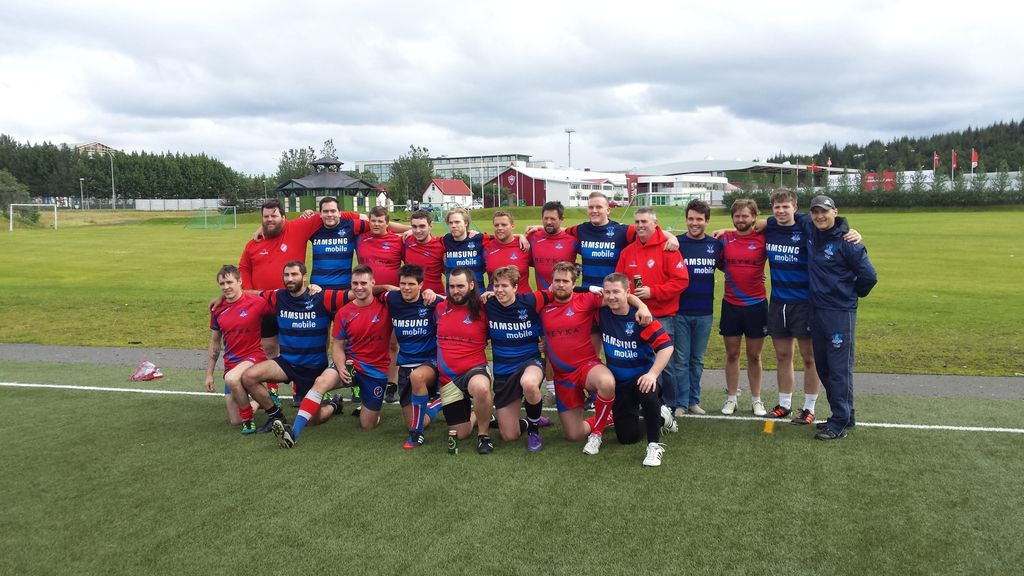If Iceland were to ever flex their muscles on the international stage then the rest of the rugby world would have no option but to sit up and take notice.
Iceland is a nation known for its size, not in terms of population, as it only has 330,000 inhabitants, but in the physique of its people. For a country that dominated the world’s strongest man competition throughout the 1980s and 90s rugby would certainly seem a natural fit.
However the sport has only been played on the island for five years, after a group of British ex-pats, led by James Broad, got together over a beer and formed Reykjavik Raiders.
From a handful of participants in those early days rugby’s popularity has steadily grown to the extent that three rugby clubs are now in existence.
As well as the Raiders, two clubs have been formed in Hafnarfjörður, Iceland’s third most populous city. The rugby section of the Haukar Sporting Club is approaching its first anniversary, while Ulfarnir, or ‘The Wolves’, got off the ground last autumn.
Having three rugby clubs will open up a host of opportunities for rugby in Iceland, says Raiders flanker and Rugby Iceland President and Secretary Kristinn Thor Sigurjonsson.
“When the third club gets well established we’ll be able to get rugby committee status within the National Olympic Committee, who are essentially the sporting governors of Iceland,” he said.
“As soon as that happens everything will become easier – from getting into schools and spreading the message about rugby to accessing funding and sponsorship from companies.
“Raising awareness of rugby is an issue for us because it is now shown on TV here and people don’t have satellites. There is only one bar in downtown Reykjavik that shows games.”
Scottish support
Despite the obstacles Sigurjonsson says that 60-70 players regularly attend training, including a small number of women.
Sessions are of a much higher standard than when Sigurjonsson first started out, thanks to Scottish input via the Rugby Europe/World Rugby Training and Education Support (TES) adoption scheme, whereby Six Nations unions support the other 42 nations affiliated to Rugby Europe.
James Wade, a coaching development officer for the Scottish Rugby Union, spent a week in Reykjavik back in October. While in the northern outpost, he supported more than 40 participants on various activities including a coaching session with Reykjavik Raiders, a teachers workshop on how to introduce rugby into schools, a Rugby Ready course and a World Rugby/Rugby Europe Level 1 Sevens Coaching course.
Wade’s visit followed on from a similar venture the year before, when the SRU’s Bosman du Plessis delivered Level 1 and 2 Coaching courses.
“When we started we just went to a public park and just threw a ball around, nobody really knew what they were doing,” said Sigurjonsson. “But when we got into the TES system the quality of sessions went up.”
Rugby sevens potential
Rugby Iceland also registered for World Rugby's Get Into Rugby programme last November and received a number of kit bags to help them implement activities, including a festival which included just over 100 boys and girls. The aim is to do an official launch this year with the support of Rugby Europe's Get Into Rugby Project Manager to assist with the promotion of the project to increase participation numbers.
Sigurjonsson added: “Our goals as Rugby Iceland have risen too. Initially we needed something to do on a Friday night, now we have kids that are aspiring to go to the Olympics and represent Iceland at rugby sevens.
“A lot of youngsters have been drawn to the sport because they see the potential sevens has to offer on a personal level.
“We take part in the annual Scandinavian Sevens and there is talk of going to Milan, London and Brussels, but that all depends on whether the players can afford to travel or not.”
Fifteens, though, remains Sigurjonsson’s primary passion. “There is too much running around in sevens,” he jokes. “I prefer the contact side of the game, that’s what got me hooked in the first place.”
Sigurjonsson was a member of the Raiders team that won the first game of 15s played in Iceland, on 3 July, 2011, against a Business School XV from the USA.
The Royal Navy and French Navy have since provided opposition while docked in Iceland, while, in 2016, Iceland hope to enter a team into Rugby Europe’s Division 3 tier of the European Nations Cup, the entry-point for new nations.
This feature forms part of our 'around the regions' series exploring the game across the globe. Do you have an interesting story to tell about rugby around the world? Let us know by emailing aroundtheregions@worldrugby.org.
